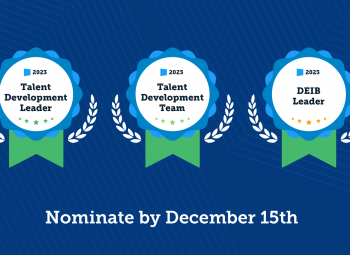The future of work is happening right now. Innovative People leaders and teams are reimagining new approaches to where, when and how we work. Help us recognize the most innovative DEIB Leaders/Teams, Talent Development Leaders/Teams, and Chief People Officers through the 2023 People Innovator Awards.
My top 5 predictions for Learning & Development in 2021
January 28, 2021
2020 brought massive upheaval in the world. Organizations were forced to respond in new ways to support employees and employee thriving, as well as continued productivity in the workplace. Not only did a global pandemic bring about new policies for ensuring a healthy workplace and remote work, but the Black Lives Matter movement and other social unrest required companies re-evaluate their current employee policies and initiatives and respond in new ways.
L&D teams have always been responsible for arming employees with new skills and new learning opportunities. As we enter 2021, here are our top predictions for where L&D leaders will be focusing their energy.
1. Diversity & Inclusion: While diversity, equity, and inclusion are something many companies have been considering in recent years, never before has there been such a clear and immediate demand for companies to demonstrate an organization-wide commitment to D&I. Not only will organizations review how their policies support a diverse workplace, but they will significantly broaden D&I training. For example, companies like Silicon Valley tech startups who previously focused on reducing gender disparity through hiring practices will institute new training programs: both those aimed at more levels of the organization as well as those covering a broader spectrum of D&I issues. And those companies who only gave lip service to D&I in the past will be forced to adopt training and mentoring to usher in a real future of equity in the workplace, or risk damage to their company’s employment brand.
2. Remote Learning Platforms: Just as companies learned to navigate the new norm of remote working, more training programs and development plans will move to self-paced, remote learning opportunities. Learners will expect the content to be timely, relevant, and delivered in more digestible chunks. As a result, companies will break from in-house training programs and move to using partners like LifeLabs who enable a more user-friendly, on-demand experience that focuses on applied learning.
3. Upskilling: Along with the move to more widespread on-demand learning, companies will have the opportunity to use “training” to not just codify policies and protocols, but also to focus on retraining and upskilling their workforce. They will also spend more on educational budgets for employees than ever before to support employee recruitment and engagement. As a result, companies will look to educational partners like Guild or learning experience platforms like Cornerstone Learning to deliver valuable education to a workforce in need of upskilling.
4. Training to be a Remote Manager: Managers have largely been able to evaluate and develop their staff within the physical boundaries of the same office space. In a Great Place to Work survey of Fortune 500 execs they found that, “Three out of five executives believe up to 25% of their workforce will continue to work remotely full-time.” With this shift, managers will need to train on how to manage remote workers in new ways, including: fresh takes on KPI setting, more codified role expectations, and learning to assess performance remotely.
5. Mid-Level Leadership Coaching: A VP of HR at a tech company told us, "The profile of what it takes to be a manager has changed." No longer can a “leader” simply be the subject matter expert or know how to run a certain department. If 2020 showed us anything, it is the need for leaders who can flex and grow with the challenges thrown their way. Leaders need agility, and companies need agile leaders at every level of their organization. While training is useful for static topics, coaching can help develop a leader to thrive amidst uncertainty. To develop a generation of leaders to face the next period of social unrest, economic crisis or - heaven forbid - global pandemic, companies will begin investing in their mid-level leaders, working with scalable leadership coaching firms like Slate Advisers.
What did I miss? If you are a HR or L&D leader, what are your major priorities for 2021? What new ways are you seeking to fortify your employees for the next wave of upheaval or uncertainty? Comment below!



Add new comment